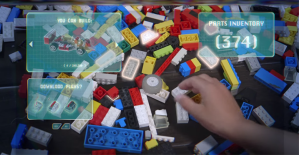
The field of new devices and applications for the mobile space is getting more crowded these days, as technology breakthroughs and consumer demand are powering a wave of exciting products. Although there is increased speculation that Google's revolutionary computerized eyewear - Glass - may never become a widely accepted consumer product, demonstrations at a recent mobile conference show that technology researchers are still fully prepared to usher us boldly into a gesture based world.
At the OnMobile 2014 conference in Menlo Park, California earlier this month, a gathering of venture capitalists and investors were given an early look at what a promising group of startup companies have created for the mobile space. One company that attracted a great deal of interest was the wearable technology startup Atheer Labs.
This small firm based in Silicon Valley gained notice recently when they recruited Alberto Torres, the former head of the mobile division for Hewlett Packard, to become their CEO. Atheer's investors include one of the first ten Google employees and the former chief technology officer for AT&T.
The demonstration at OnMobile this month featured glasses developed by Atheer that are not virtual reality headsets which place you in the "action" through immersive video. Instead, they create a computerized "screen" in your field of vision that can be moved and manipulated in real time. The result is a kind of hologram that hovers over the space in front of your eyes and allows you to move 3D images around in mid-air using your hands.
Atheer's glasses, which run on Android, are currently being beta tested by partners in the medical analysis or aerospace design fields. They represent a significant bridge between the wearable computing concept introduced three years ago by Google Glass and new technology uses beyond the everyday consumer.
There were other new technologies on display at OnMobile besides gesture-based eyewear. ThirdLove demonstrated an app that transforms your smartphone into a "virtual measuring tape."
The company was founded by Heidi Zak who was interested in offering women better options to size and shop for lingerie. Using a smartphone camera, a ThirdLove user self-measures their torso and sends two photos to the company computer which then matches the images to the proper size and ships the garment.
Another company on display was deCarta, an independent mapping and local search firm. This past October, deCarta announced a joint development and marketing agreement with the navigation company TomTom.
DeCarta was originally the mapping technology used by Google Maps until 2008. Today, their location software is used by GM OnStar, Samsung and Blackberry. They also offer a dedicated site where anyone can try out their mapping tool which offers remarkably detailed satellite imagery.
VinCompass is offering a mobile tool for wine connoisseurs. The San Francisco based company has uploaded the wine lists of over 10,000 restaurants. While you are dining, you can use their mobile app to determine the wine best suited to your personal tastes and budget.
Another new and unusual twist for the mobile dining space can be found in Chop, which bills itself as "the first safe, free, peer-to-peer dining network." The concept behind their mobile app is that anyone can post what they are cooking and when. If neighbors like what you are making in the kitchen, they use the app to order it from you and then go pick it up.
According to CEO Henry Minden, Chop "is designed to solve the problem of wondering what you are going to eat today." No real money changes hands. Instead, participants who "sell" what they are cooking get "karma" credits which can then be exchanged with others in the Chop network for their own meals.
At the start of OnMobile, AlwaysOn Editor Tony Perkins told the gathering that this would likely be the final year his group would hold the event because "everything needs to be mobile, it's like oxygen." With the almost daily drumbeat of new mobile products, ranging from 3D eyeglass computing to smartphone measuring tools and beyond, it's hard to disagree with the notion that mobile technology is now as common as the air we breathe.







